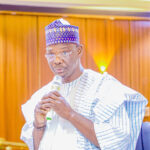Grain farmers in Jengre, Plateau State and Saminaka in Kaduna say the price of fertiliser and poor road networks have become major factors militating against the prospects of their activities and markets. Daily Trust Saturday visited the two grain farming communities and reports.
Jengre, a densely populated community in Plateau State, has one of the major grain markets. The community is 25 kilometres from Saminaka, another grain-producing community on the major stretch road that connects Plateau State with Kaduna. The two communities have for decades, attracted farmers, entrepreneurs, traders within and outside Nigeria, who buy the produce for human and animal consumption.
Speaking on the prospect of grains in the state, Abubakar Bako Nabasu, a veteran farmer from Amo Maikatako village in Jengre district of Bassa Local Government Area of Plateau State said, “I am not sure our harvest this year would be profitable due to the high cost of fertiliser and the decline we are experiencing in the price of our produce.”
Daily Trust Saturday reports that residents of the two communities are mostly small or large-scale grain producers. In these communities, prominent and busy grain markets exist, where buyers and sellers meet on market days to trade. While the Jengre grain market takes place on Sundays, people converge on Wednesdays for the Saminaka market.
- Burna Boy, Rema spend millions on latest assets
- Morocco seeking to become Africa’s first semi-finalists
However, pointing fingers on several factors and specifically on the high cost of fertiliser as hindrance to their business, Nabasu said if the price of grains, especially maize, continued to tumble, farmers may not cultivate during next year’s farming season.
“We may only focus on cultivating beans and groundnuts that do not require as much fertiliser as maize and rice,” he said, expressing doubt that grain farmers would record profit from this year’s harvest considering the amount of money expended in purchasing fertiliser.
Although the two communities are located in two different states, they were both established in the 1980s and have become a hub for major grains. Buyers frequent these markets at regular intervals. They buy the grains and move them to other markets in various states and neighbouring countries.
Incidentally, farmers in these communities are lamenting that high cost of fertiliser and bad road networks are increasingly dashing their hopes, a situation that might affect their farming plans next year.
“Farming of grains this year might not be profitable considering the price of fertiliser in the market. Last year, we bought a bag of fertiliser between N10,000 and N12,000, but this year, we bought a bag between N25,000 and N30,000,” Abubakar Bako Nabasu said.
The cost of fertiliser is not only a concern to farmers but grain merchants. They lament that the cost of fertiliser during this year’s farming season skyrocketed, which is affecting their business, adding that if something is not done about the situation, there might be food shortage next year as farmers might not work.
The challenges are the same for farmers in Saminaka, who said the price of grain, especially at the beginning of this year’s dry season, was not encouraging, and if it fails to appreciate, many farmers in the area may shun grain farming next year.
Maiwada Dauda, a grain dealer in Saminaka market, described the high cost of fertiliser as a factor militating against the projection of the farmers’ post-harvest earnings.
He said, “Last year, farmers had a bumper harvest and fertiliser was not as expensive as it is now. But this year, the cost of fertiliser has become a major challenge to farmers and us.
“Equally, flooding and pest infestation on some farms are contributory factors.”
Speaking to Daily Trust Saturday, the chairman of the Jengre grain market, Malam Mustafa Umar, said it was unfortunate that buoyant farmers purchased fertiliser but their farms were washed away by floods. “This has added to our problem,” he said.
But the chairman of the Amana Farmers and Grain Supply Association (AFGASAN) in Kaduna State, Alhaji Nurudeen Danladi, said the high cost of fertiliser was a global problem.
“It is not peculiar to Nigeria. One factor is the cost of transportation from where the factory is to other destinations. It is quite expensive. If you look around, many truck owners have parked their trucks due to the high cost of diesel. So, all these factors have contributed to the increase in the cost of fertiliser this year,” he said, adding that the commodity appears to be cheaper in Nigeria than other countries.
Another major impediment to grain farming in Jengre and Saminaka has been the poor state of roads leading to markets. Farmers conveying their crops to various markets often find it difficult to navigate the narrow, untarred road networks in many parts of Nigeria’s hinterlands.
“We have been suffering for many years. We have not enjoyed dividends of democracy in this community. The government would always promise to reconstruct the road but nothing has been done, even as we speak. If the roads are properly constructed and rehabilitated, it would boost agricultural activities by improving food production in the country,” Nabasu said.
Ibrahim Tambaya, chief of staff to the Pengana traditional ruler in Jengre, while lamenting on the condition of the roads said, “During the rainy season vehicles cannot access the farms. Only motorcycles are used to convey the farm produce. In some cases, even the motorcycles can’t make it to the farms due to the condition of the roads.
“Our farmers and other people are suffering. The roads leading to Jengre from other villages have deteriorated, and sometimes, even pregnant women suffer on these roads on their way to hospital. That is why we are begging the government to help us reconstruct the roads.”
Residents of other villages along Saminaka also lamented the condition of the roads, saying it is usually worse during the rainy season.
Shu’aibu Jajibere, a resident of Pedere community, along Saminaka road, said the area was always waterlogged during the rainy season, forcing drivers to find alternate routes.
“Sometimes incoming vehicles would have to stop until those on the other lane are able to pass. We cannot transport our farm produce using cars or buses, we have to use motorcycles and carts to transport our grains to the market,” he said.
The village head of Pedere community, Babangida Ubale, also explained that “small-scale farmers can’t take their produce to either Jengre or Saminaka markets due to poor condition of the road. He urged the authorities concerned to do something before the next rainy season.
Merchants come from Niger, Cameroon, Chad
Mustafa Umar and Manu Idris, chairpermen of Jengre and Saminaka grain markets respectively, said that apart from Nigerian grain merchants, buyers from neighbouring countries, such as Niger, Cameroon and Chad, bought grains from Jengre and Saminaka markets.
“This is a big grain market. It connects various villages of Kaduna, Kano, Bauchi and other states. Our brothers from other regions of the country do visit and buy grains from these markets,” Manu Idris, whose narrative was corroborated by Mustapha Umar, said.
Idris said people from Darki, another grain market in Kano State, also purchased grains from Saminaka, adding that most industries in Nigeria rely on the market.
Umar said, “During the dry season and on every market day, hundreds of grain truckloads are taken out of the market to other places as many farmers had already harvested their crops.”
Apart from northern buyers, southerners have for decades patronised the markets and moved grains to the southern part of the country.
Hassan Tata, a dealer in the Jengre grain market, said the relationship between sellers and buyers from the South had been cordial, adding that such rapport has helped to build trust between them.
Tata said: “We have been transacting with them for years and the relationship has been pleasant so far. Out of trust, they send us money to buy the grains and send back to them in the South without coming up to the North.
“To strengthen our relationship, we also invite them to the North to see for themselves, both the market and our houses. At some points, they invite us to the South to see their homes too, based on the trust.”
Ifesi Mark, a grain buyer from Imo State, said the relationship with northern grain farmers had been cordial, adding, “There is no segregation when it comes to business. There are neither religious nor ethnic differences. We have been together for a very long time.”
Gengre and Saminka have over the years become a business hub for farmers and consumers from diverse backgrounds. Farmers and merchants said if the challenges are tackled, the two markets could serve as a significant revenue-generating areas for the government and ensure food security by making farm produce affordable.

 Join Daily Trust WhatsApp Community For Quick Access To News and Happenings Around You.
Join Daily Trust WhatsApp Community For Quick Access To News and Happenings Around You.



